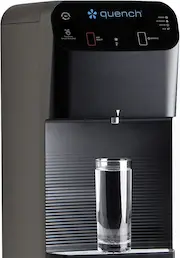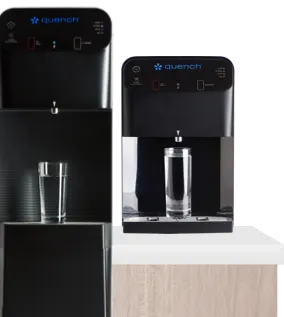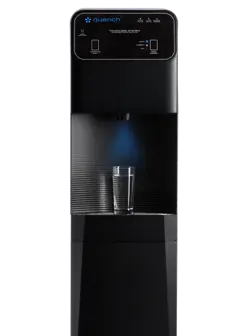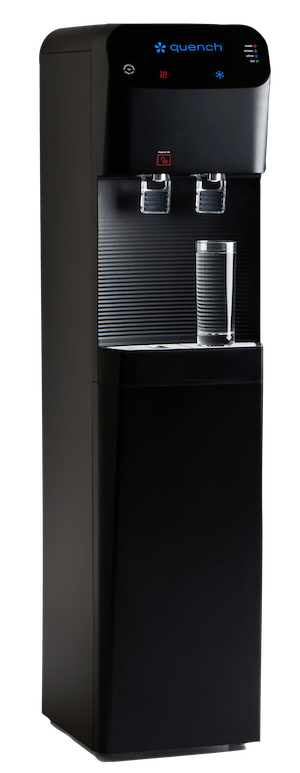UPDATED ON:
An unwanted smell from your drinking water is often a sign of bigger issues plaguing your tap or pipes. If you’re noticing a fish smell in your water, this is likely due to naturally occurring organic material that’s found its way into your water source. Often this smell doesn’t signify the presence of a harmful contaminant, but it could indicate that your drinking water isn’t the cleanest and should be inspected to restore it to its purest state.
Quick Facts:
- A fishy smell can be caused by some elements like Barium or Cadmium metals.
- Chloramine is a compound of chlorine and ammonia used to disinfect public water sources. Unfortunately, it can cause an unwanted fishy odor in your water.
- You may notice an increase in smells like this during the summertime because algae blooms are more prevalent in lakes and water reservoirs when in direct sunlight and warm water.
- The long-term solution to this smell will likely have to come from your local water supplier.
What Causes the Smell?
1. Organic Material
The main reason for an odd or fishy smell coming from your tap water is the presence of naturally occurring, organic material found in your water source. Barium is a metal that exists in mineral ores and can seep into wells and pipes causing a foul smell in your drinking water. The EPA manually manages the amount of Barium in public water to keep it below the recommended level. Cadmium is another metal that finds its way into pipes through industrial waste or fertilizer contamination.
2. Chloramine
Another cause of this fish smell is the combination of chlorine and ammonia, which together create a compound called Chloramine. This is often used to disinfect public water sources and can sometimes produce an unpleasant aroma in your water.
3. Algal Blooms
Finally, if you notice the smell in the summertime, it’s likely caused by algal blooms. Lakes and reservoirs often see an increase in algae blooming on the surface of the water when there’s plenty of warmth and direct sunlight. Although water treatment plants rid the water of the algae, the particles that cause the fishy smell can sometimes be detected by people who are overly sensitive to musty or mildew-like smells. The presence of these particles doesn’t pose any direct threat to your health, but it’s still a good idea to alert your water company of the issue to get more information and understand if it’s a known problem.
What Other Factors Could Be Responsible for Smelly Water?
Sulfur contamination is typically an obvious culprit for water that smells, giving it a distinctive “rotten egg” odor. Bacterial contamination is another issue that can cause a variety of smells, including a musty or earthy scent, or even a sewage-like odor, depending on the specific bacteria present. However, several other factors may contribute, like:
- Decaying organic matter, releasing foul odors like those of mold or mildew.
- Chemical pollutants from industrial or agricultural activities, leading to unpleasant bleach-like or medicinal odors.
- Pipe or water heater corrosion, resulting in metallic or rust-like smells.
- Geological features, influencing water quality and contributing to odors like earthiness or metallic tang.
- Poorly maintained storage tanks or reservoirs, fostering bacterial growth.
What Are the Risks of Drinking Water That Smells?
Considering all the potential contaminants outlined above, there are several risks linked to drinking water with an unpleasant odor:
- Microbial contamination: The potential presence of bacteria, viruses, or other microorganisms can leave you vulnerable to gastrointestinal infections and illness.
- Chemical pollution: Chemical pollutants, such as pesticides, heavy metals, or industrial chemicals, may pose long-term health risks if ingested. This includes an increased risk of cancer, organ damage, and reproductive disorders.
- Allergic reactions: Chloramine and other specific contaminants can trigger allergic reactions or respiratory issues in sensitive individuals.
- Toxic algal blooms: Algal blooms may release toxins harmful to human health if consumed. Symptoms range from gastrointestinal issues, such as nausea and vomiting, to more severe effects like liver damage or neurological problems.
- Disinfection byproducts (DBPs): When combined with organic matter, chlorine or chloramine used in water treatment can form DBPs linked to potential health risks. These include an increased risk of cancer, reproductive problems, and adverse effects on the liver, kidneys, and central nervous system.
- Digestive issues: Consuming potentially contaminated water may lead to digestive discomfort, nausea, or diarrhea — particularly if microbial contamination is present.
So, What Should You Do?
Because the smell is commonly caused by organic material in your pipes or well, there’s little you can do yourself to fix the issue. You can try flushing your pipes to rid them of any debris or loose contaminants, but the problem likely requires a more complex solution. A professional may recommend increasing chlorine levels in your water source or well to balance out the influx of organic material.
For most people, drinking water comes from a public water company and you can give them a call to discuss the issue with them directly. However, if you use a private well, you’ll have to call a specialist to inspect your well.
Use this trick to test if the smell is coming from your well or your pipes:
- Pour a glass of tap water and go into the other room.
- Swirl the glass around a few times and then take a whiff.
- If you can’t detect the fishy smell, it’s likely coming from organic material in your pipes rather than contamination from your well.
Discover Solutions for Water That Smells Like Fish
If you feel that relying solely on your municipal water treatment for clean, great-tasting, and good-smelling water isn’t sufficient, there are several additional solutions you can consider:
- Boiling water: Boiling water effectively kills bacteria and removes some chemical contaminants, improving both taste and odor. Bringing water to a rolling boil for at least one minute is the best practice to ensure safety and minimize the risk of unpleasant smells.
- UV water purification: UV water treatment uses ultraviolet light to destroy harmful microorganisms, providing an additional layer of protection against bacteria, viruses, and other pathogens.
- Reverse osmosis (RO) filtration: RO filtration systems use a semi-permeable membrane to remove contaminants and leave you with clean water. But, it’s worth mentioning that with RO filtration, both odors and flavors are removed. This typically necessitates an additional step to reintroduce minerals for taste.
- Activated carbon filtration: Activated carbon filters effectively absorb and trap chlorine, chloramine, and other chemical contaminants, enhancing taste and eliminating unpleasant odors.
- Multiple-stage filtration: Your best bet for delicious water that smells great, too, is to use multiple layers of filtration. For instance, quenchWATER+ is our Quench-branded mineral-infused water, filtered on demand through our proprietary 5-filter setup. RO and activated carbon filtration are integrated with our Mineral+ filter to produce alkaline and electrolyte-enhanced water — so you can enjoy longer-lasting hydration and peace of mind.
Cleaning Your Drinking Water
The smell in your water is likely harmless. However, it can also be extremely annoying. Water coolers with reverse osmosis filtration and/or carbon filtration can eliminate or significantly reduce the presence of odor-causing bacteria. You can even consider options that provide multiple layers of filtration for the cleanest and most delicious results.
Quench offers a range of bottleless water cooler options tailored to your unique water quality needs. Explore our product line, or get a free estimate for a bottleless cooler today.








